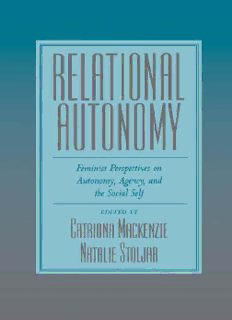
Relational Autonomy: Feminist Perspectives on Autonomy, Agency, and the Social Self PDF
Preview Relational Autonomy: Feminist Perspectives on Autonomy, Agency, and the Social Self
RELATIONAL AUTONOMY This page intentionally left blank RELATIONAL AUTONOMY Feminist Perspectives on Autonomy, Agency, and the Social Self Edited by Catriona Mackenzie and Natalie Stoljar New York Oxford Oxford University Press 2000 Oxford University Press Oxford New York Athens Auckland Bangkok Bogota Buenos Aires Calctta Cape Town Chennai Dar cs Salaam Delhi Florence Hong Kong Istanbul Karachi Kuala Lumpur Madrid Melbourne Mexico City Mumbai Nairobi Paris Sao Paulo Singapore 'Taipci Tokyo Toronro Warsaw and associated companies in Berlin Ibadan Copyright & 2000 by Oxford University Press Published by Oxford Univcrsity Press 198 Madison Avenue, New York, New York 10016 Oxford is a registered trademark of Oxford University Press. All rights reserved. No part of this publication may be reproduced, stored in a retrieval system, or transmitted, in any form or by any means, electronic, mechanical, photocopying, recording or otherwise, without the prior permission of Oxford University Press. Library of Congress Cataloging-in-Puhlication Data Relational autonomy : feminist perspective on autonomy, agency, and the social self / edited by Catriona Mackenzie and Natalie Stoljar. p. cm. ISBN 0-19-512333-6; ISBN 0-19-512:334-4 (pbk.) 1. Feminist theory 2. Autonomy. 3. Agent (Philosophy) 4. Self (Philosophy) I. Mackenzie-, Catriona. II. Stoljar, Natalie. HQ1190.R45 1999 305.42—DC21 99-12792 13579 8 642 Printed in the United States of America on acid - free paper ACKNOWLEDGMENTS We wish to express our gratitude to the contributors to this volume for their en- thusiasm for the project and the generosity with which they responded to edito- rial comments and suggestions. Diana Meyers also provided encouragement and invaluable advice at various stages of the project. Some of the articles in the volume were originally presented at the Conference on Feminist Perspectives on Autonomy and Agency, held at the Australian National University in June 1996. We are grateful to Fiona Webster for conference organiza- tion and to all the participants at the conference, especially to Susan Brison, Lor- raine Code, Marilyn Friedman, and Diana Meyers, who traveled from North Amer- ica to present their papers. For financial assistance in hosting the conference, we are indebted to the Philos- ophy Program, Research School of Social Sciences, ANU; the Social and Political Theory Group, Research School of Social Sciences, ANU; the Department of Phi- losophy, Faculty of Arts, ANU; and the Australia Foundation for Culture and the Humanities. Financial support for the project as a whole was provided by an Aus- tralian Research Council Small Grant and a Macquarie University Visiting Scholar Research Grant. vi Acknowledgments We received invaluable research assistance from Fiona Webster in the intial stages of the project and from Sarah Bachclard in the final stages. Special thanks are due to Ian Gold, Peter Menzies, and our families. Sydney, Australia C. M. May 1999 Canberra, Australia N. S. May 1999 CONTENTS Contributors ix Introduction: Autonomy Refigured 3 Catriona Mackenzie and Natalie Stoljar I AUTONOMY AND THE SOCIAL 1 Autonomy, Social Disruption, and Women 35 Marilyn Friedman 2 Autonomy and the Social Self 52 Linda Barclay 3 Feeling Crazy: Self-Worth and the Social Character of Responsibility 72 Paul Benson 4 Autonomy and the Feminist Intuition 94 Natalie Stoljar 5 Individuals, Responsibility, and the Philosophical Imagination 112 Genevieve Lloyd 6 Imagining Oneself Otherwise 124 Catriona Mackenzie viii Contents 7 Intcrscctional Identity and the Authentic Self?: Opposites Attract! 151 Diana Tietjens Meyers 8 The Perversion of Autonomy and the Subjection of Women: Discourses of Social Advocacy at Century's End 181 Lorraine Code II RELATIONAL AUTONOMY IN CONTEXT 9 Choice and Control in Feminist Bioethics 213 Susan Dodds 10 Autonomy and Interdependence: Quandaries in Genetic Decision Making 236 Anne Donchin \ 1 Relational Autonomy, Self-Trust, and Health Care for Patients Who Arc Oppressed 259 Carolyn McLeod and Susan Sherwin 12 Relational Autonomy and Freedom of Expression 280 Susan]. Brison Index 301 CONTRIBUTORS LINDA BARCLAY is a lecturer in ethics at La Trobe University. Her main research is in applied ethics, including professional ethics and political philosophy. PAUL BENSON is associate professor of philosophy at the University of Dayton. He works primarily in the areas of action theory, moral psychology, and social philoso- phy and is currently writing a book about the social and normative dimensions of free agency. SUSAN J. BRISON is associate professor of philosophy at Dartmouth College, where she also teaches in the women's studies program. She has published articles on fem- inist ethics, philosophy of law, and social and political philosophy in anthologies and in journals including Ethics, Legal Theory, and Nomos. Coeditor of Contempo- rary Perspectives on Constitutional Interpretation (Westview, 1993), she is author of Speech, Harm and Conflicts of Rights (Princeton University Press, forthcoming 2000) and is currently writing a book on trauma and memory. LORRAINE CODE is distinguished research professor of philosophy at York Univer- sity in Toronto. She is the author of Epistemic Responsibility (University Press of New England, 1987), What Can She Know? Feminist Theory and the Construction of Knowledge (Cornell, 1991), and Rhetorical Spaces: Essays on (Gendered) Locations ix
Description: